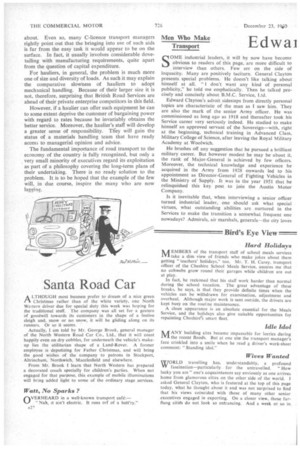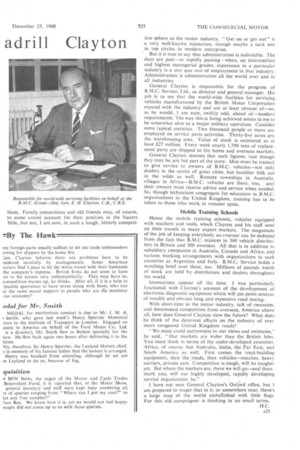Edwai adrill Clayton
Page 24

Page 25

If you've noticed an error in this article please click here to report it so we can fix it.
SOME industrial leaders, it will by now have become obvious to readers of this page, are more difficult to interview than others. Few err on the side of loquacity. Many are positively taciturn. General Clayton presents special problems. He doesn't like talking about himself at all. "I don't want any kind of personal publicity," he told me emphatically. Then he talked precisely and concisely about B.M.C. Service, Ltd.
Edward Clayton's adroit sidesteps from directly personal topics are characteristic of the man as I saw him. They are also the mark of the senior Army officer. He was commissioned as long ago as 1918 and thereafter took his Service career very seriously indeed. He studied to make himself an approved servant of the Sovereign—with, right at the beginning, technical training in Advanced Class, Military College of Science, after leaving the Royal Military Academy at Woolwich.
He brushes off any suggestion that he pursued a brilliant military career. But however modest he may be about it, the rank of Major-General is achieved by few officers. Moreover, the technical knowledge and experience he acquired in the Army from 1928 onwards led to his appointment as Director-General of Fighting Vehicles in the Ministry of Supply. It was in the year 1951 that he relinquished this key. post to join the Austin Motor Company.
Is it inevitable that, when interviewing a senior officer turned industrial leader, one should ask what special virtues, what outstanding abilities are nurtured in the Services to make the transition a somewhat frequent one nowadays? Admirals, air marshals, generals—the city loves
them. Family connections and old friends may, of course, to some extentaccount for their position in the Square Mile, but not, I am sure, in such a tough, bitterly competi
tive sphere as the motor industry. "Get on or get out" is a very well-known injunction, though maybe a tacit one in top circles in modern enterprise.
' But it is true to say that administration is indivisible. The days are past—or rapidly passing—when, on intermediate and highest managerial grades, experience in a particular industry is a sine qua non of employment in that industry. Administration is administration all the world over and in all industries.
General Clayton is responsible for the progress of B.M.C. Service, Ltd., as director and general manager. His job is to see that the world-wide facilities for servicing vehicles manufactured by the British Motor Corporation expand with the industry and are at least abreast of—or, as he would, I am sure, swiftly add, ahead of—modern requirements. The way this is being achieved seems to me to be somewhat akin to a major military operation. Consider some typical statistics. Two thousand people or more are employed on service parts activities. Thirty-five acres are the warehousing area. Value of stock is estimated as at least £27 million. Every week nearly 1,700 tons of replacement parts are shipped to the home and overseas markets.
General Clayton stresses that such figures, vast though they may be, are but part of the story. Men must be trained to give service to owners of B.M.C. vehicles—not only dealers in the centre of great cities, but humbler folk out in the wilds as well. Remote townships in Australia, villages in Africa—B.M.C, vehicles are there, too, and their owners must receive advice and service when needed. So, though technicians congregate for education in B.M.C. organizations in the United Kingdom, training has to be taken to those who work in remoter spots.
Mobile Training Schools
Hence the mobile training schools, vehicles equipped
with teachers and tools, which Clayton and his staff send on their travels in many export markets. The magnitude of the job of keeping everybody au courant can be deduced from the fact that B.M.C. rejoices in 360 vehicle distributors in Britain and 500 overseas. All that is in addition to subsidiary companies in Australia, Canada and Africa, and various working arrangements with organizations in such countries as Argentina and Italy. B.M.C. Service holds a watching brief over these, too. Millions of pounds worth of stock are held by distributors and dealers throughout the world.
Innovations appear all the time. I was particularly fascinated with Clayton's account of the development of electronic diagnostic equipment which will pin-point sources of trouble and obviate long and expensive road testing.
With short-time in the motor industry, talk of recession, and determined competition from overseas, America above all, how does General Clayton view the future? What does he think of the deterrent effects on the industry of ever more congested United Kingdom roads?
" We must avoid narrowness in our views and estimates," he said, " Our markets are wider than the British Isles. You must think in terms of the under-developed countries. Africa, of course, but Australia, India, the Far East, and South America as well. First comes the road-building equipment, then the roads, then vehicles—coaches, heavy carriers, private cars. Competition is tough, will be tougher yet. But where the markets are, there we will go—and there. mark you, will our highly developed, rapidly developing service organization be."
I have not seen General Clayton's Oxford office, but I am prepared to wager that in it, or somewhere near, there's a large map of the world embellished with little flags. For this old campaigner is thinking in no small terms.




























































































